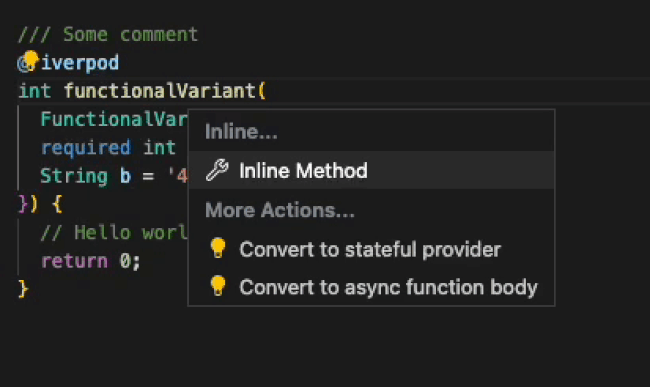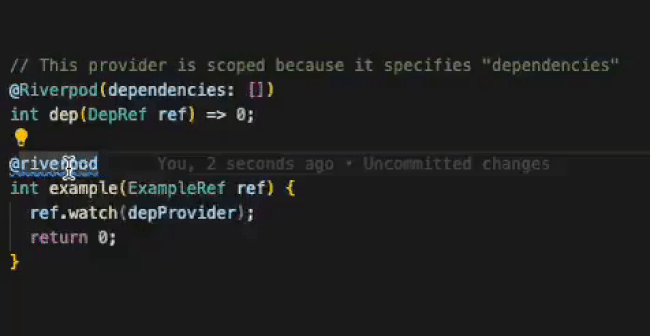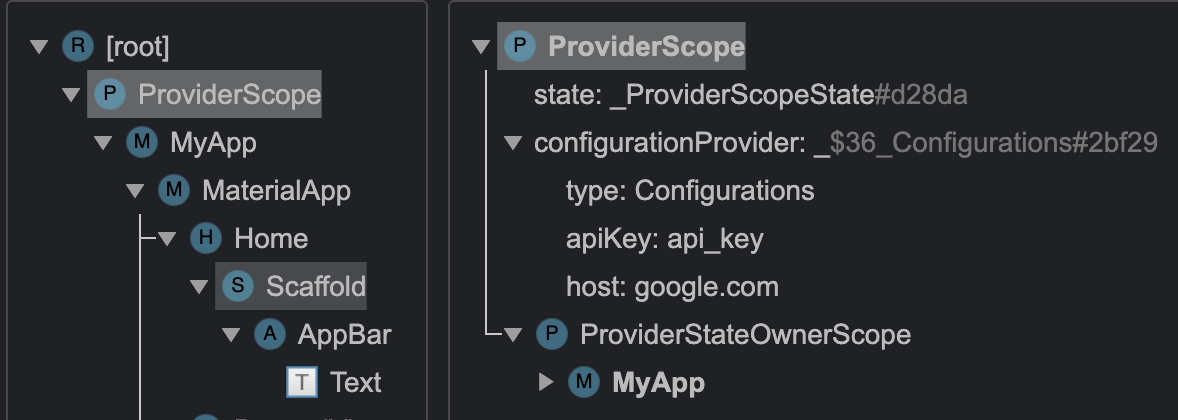Declarative programming
Write business logic in a manner similar to Stateless widgets.
Have your
network requests to automatically recompute when necessary and make
your logic easily reusable/composable/maintainable.
Easily implement common UI patterns
Using Riverpod, common yet complex UI patterns such as "pull to refresh"/ "search as we type"/etc... are only a few lines of code away.
Tooling ready
Riverpod enhances the compiler by having common mistakes be a compilation-error. It also provides custom lint rules and refactoring options. It even has a command line for generating docs.
Features
- ✅ Declarative programming
- ✅ Native network requests support
- ✅ Automatic loading/error handling
- ✅ Compile safety
- ✅ Type-safe query parameters
- ✅ Test ready
- ✅ Work in plain Dart (servers/CLI/...)
- ✅ Easily combinable states
- ✅ Built-in support for pull-to-refresh
- ✅ Custom lint rules
- ✅ Built-in refactorings
- ✅ Hot-reload support
- ✅ Logging
- ✅ Websocket support
- ✅ Documentation generator
Declara un estado compartido desde cualquier lugar
Ya no es necesario saltar entre tu main.dart y tus archivos de interfaz de usuario. Escribe el código de tu estado compartido donde pertenece, ya sea en un paquete separado o justo al lado del Widget que lo necesita, sin perder la capacidad de hacer pruebas.
// A shared state that can be accessed by multiple widgets at the same time.
class Count extends _$Count {
int build() => 0;
void increment() => state++;
}
// Consumes the shared state and rebuild when it changes
class Title extends ConsumerWidget {
Widget build(BuildContext context, WidgetRef ref) {
final count = ref.watch(countProvider);
return Text('$count');
}
}
Recalcular el estado y reconstruir el interfaz solo cuando sea necesario
Ya no tenemos que ordenar y/o filtrar listas dentro del método build o tener que recurrir a un mecanismo de caché avanzado.
Con Provider y "families", puedes ordenar tus listas o hacer solicitudes HTTP solo cuando realmente lo necesites.
List<Todo> filteredTodos(Ref ref) {
// Providers can consume other providers using the "ref" object.
// With ref.watch, providers will automatically update if the watched values changes.
final List<Todo> todos = ref.watch(todosProvider);
final Filter filter = ref.watch(filterProvider);
switch (filter) {
case Filter.all:
return todos;
case Filter.completed:
return todos.where((todo) => todo.completed).toList();
case Filter.uncompleted:
return todos.where((todo) => !todo.completed).toList();
}
}
Simplify day-to-day work with refactors
Riverpod offers various refactors, such as "Wrap widget in a Consumer" and many more. See the list of refactorings.

Keep your code maintainable with lint rules
New lint-rules specific to Riverpod are implemented and more are continuously added. This ensures your code stays in the best conditions. See the list of lint rules.

Lea los providers de forma segura
Leer un provider nunca resultará en un mal estado. Si puedes escribir el código necesario para leer un provider, obtendrás un valor válido.
Esto incluso se aplica a los valores obtenidos de forma asíncrona. A diferencia de Provider, Riverpod te permite manejar de forma limpia los casos de carga y error.
Future<Configuration> configurations(Ref ref) async {
final uri = Uri.parse('configs.json');
final rawJson = await File.fromUri(uri).readAsString();
return Configuration.fromJson(json.decode(rawJson));
}
class Example extends ConsumerWidget {
Widget build(BuildContext context, WidgetRef ref) {
final configs = ref.watch(configurationsProvider);
// Use pattern matching to safely handle loading/error states
return switch (configs) {
AsyncData(:final value) => Text('data: ${value.host}'),
AsyncError(:final error) => Text('error: $error'),
_ => const CircularProgressIndicator(),
};
}
}
Inspecciona tu estado en el devtool
Usando Riverpod, por defecto, tu estado es visible dentro del devtool de Flutter. Por si fuera poco, una herramienta integral de inspección de estados esta en desarrollo.
